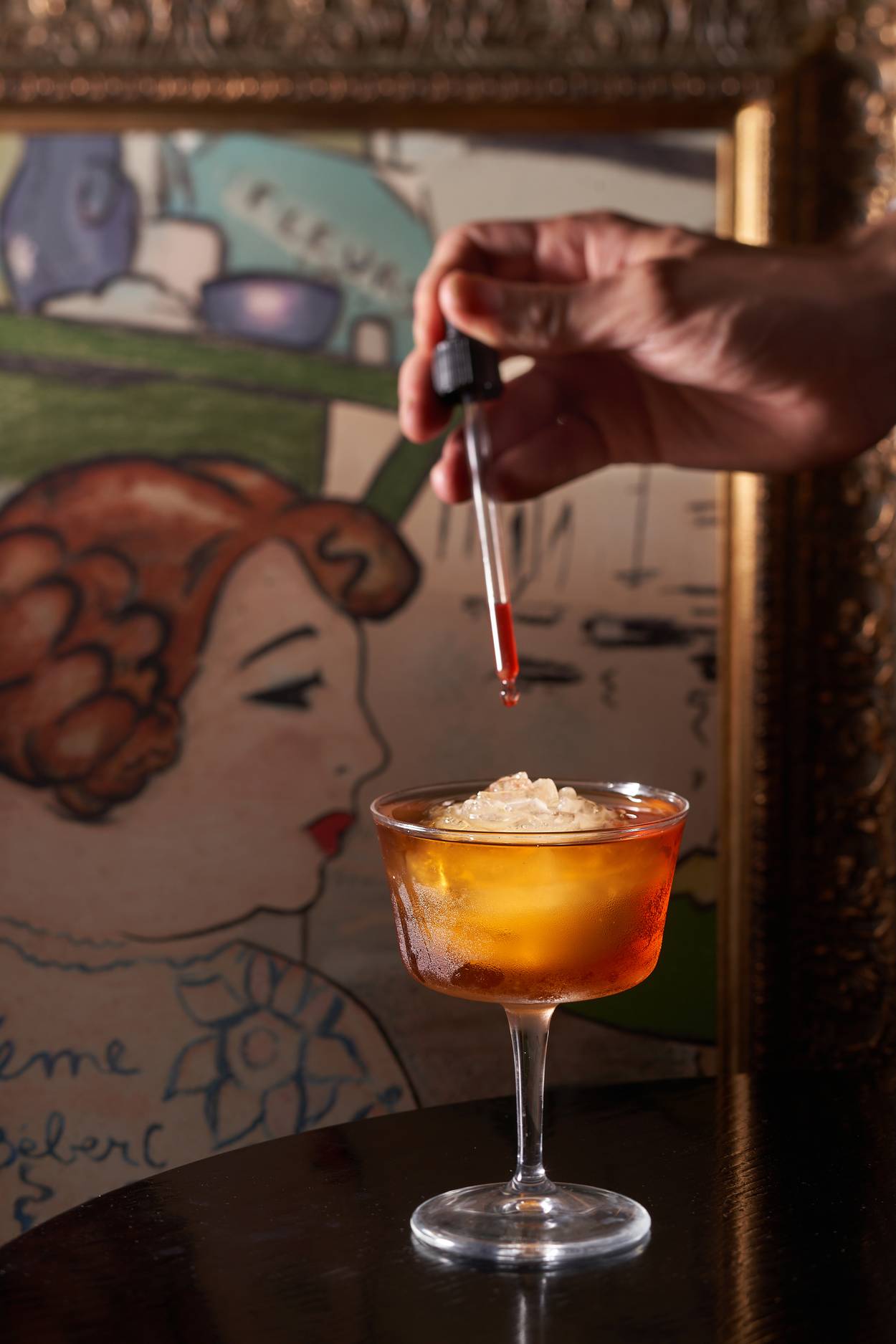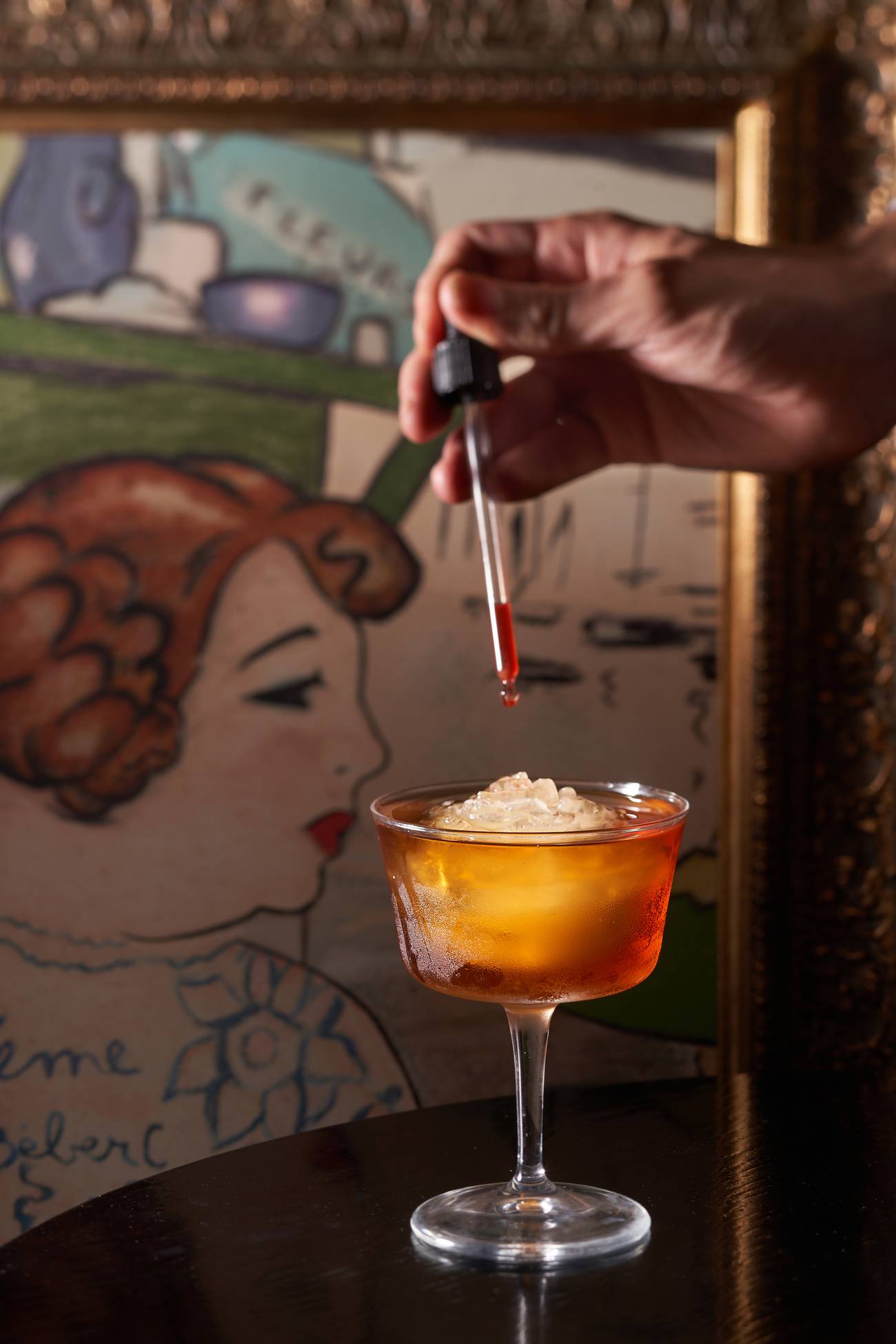Cocktail Culture Takes a New Twist in Tel Aviv
Israeli liquor producers are putting local flavors in their new creations




The Bellboy, a seductive bar tucked inside a boutique hotel on Berdichevsky Street in Tel Aviv, feels like an establishment fit for New York or London, with its well-dressed patrons and leather barstools. And yet, you can order a pomegranate-infused “Jerusalem punch” off the menu, or a whiskey sour prepared with sesame. Hotel Montefiore, another Tel Aviv favorite, may be a hallmark of European elegance—white tablecloths and polite servers aplenty—but at the hotel restaurant’s bar, alongside the Negroni and the Sazerac, you can order a mezcalita, flavored with herbs foraged in the Galilee.
If you went to a Tel Aviv bar in 2001 and asked for a cocktail, chances are you’d have gotten a neon-hued, sugary creation that was geographically ambiguous. But, just as the city’s local culinary scene has risen to new levels, so has the drinking culture. And these days, Tel Aviv’s cocktail culture is focusing on homegrown flavors from local creators.
“There are so many interesting things going on with local spirits and cocktail ingredients right now,” said Elad Shoham, the beverage director for R2M Group, which owns Hotel Montefiore. While already known for its wine industry, whiskey initiatives and craft beer, Israel had been relying on imports for all things mixology—the art of the cocktail. Now, partially inspired by the pandemic, locally made shrubs, bitters, tonics, vermouth, and liquors are becoming increasingly important. The local trend has been twofold: leaning on ingredients made in the country, and on flavor profiles that are distinctly Israeli.
“Once the local scene develops, as a consequence the makers are starting to be aware of new possibilities,” said Ariel Leizgold, the owner and mastermind behind Bellboy, which opened in 2014 and has been a pioneer of the local cocktail movement. Currently, the Bellboy Group owns several bars in Tel Aviv. “And, as a part of the global trend of small makers that make classic drinks using local techniques, we see it in Israel as well.”
Having said that, COVID-19—which locked Israelis in their homes repeatedly in 2020 and 2021—had certainly heightened everyone’s curiosity toward cocktail ingredients. Bellboy itself launched make-at-home cocktail kits at the end of 2020, which would highlight the different brands that join forces to make a really good cocktail. “People had more time on their hands and became open to exploring,” Leizgold said. “The past year has certainly opened consumers’ and makers’ eyes to the possibility of creating and sampling exclusively Israeli drinks.”
One of the biggest names in the game is Jullius, a brand based in the north of Israel, which started its way as the wild fantasy of Yuval Hargil, then a food critic. Launching his “crazy, unbelievable” endeavor in 2008 with specialty spirits like eau de vie, Hargil recently started creating Jullius Bitters, a herbaceous digestif with typical Galilee herbs like zuta levana (white-leaved savory) and sage. “My dream was to create a drink that solely represents the Galilee in its flavor profile,” said Hargil. The brand launched an online store in 2020, becoming more available to the public.
During the pandemic, Jullius also launched a beverage named Fukcorona, a “potent herbal potion” with locust and wormwood, that’s now sold out. “In recent years people are looking to go back to the Israeli terroir, looking for that Israeli flavor,” Hargil said. “I think we now have a defined-enough identity as a country to explore new territories in alcohol that would normally be submerged in foreign heritage and history.”
And so, Israelis have been plunging into vermouth (experienced winemaker Eyal Drori recently launched his own brand, Vendetta 52), tonics (bartender Naama Szterenlicht started making hand-labeled concoctions from fruits and herbs foraged in Tel Aviv), and even unexpected liquors, such as Flora—a passion fruit-flavored sensation by entrepreneur Shai Fishbain. Small producers have had to share the spotlight with established ones that have more funding and also want in on the spirits business. One key player is Pelter Winery. A number of years ago, the popular winery launched a new line of locally made spirits with an Israeli twist; think brandy made with medjool dates.
These new offerings are sold directly to customers online, show up at eclectic wine boutiques and culinary centers like Asif in Tel Aviv, and pop up on the menus at bars. Both Leizgold and Shoham say that they have had no shortage of entrepreneurs inviting them to try their latest mixology-forward creations, with the hopes to be listed among the establishments’ cocktail ingredients. “I’m always happy to include local products in our menus, because it’s part of showcasing local specific products you can’t find anywhere else, a bit farther from the mainstream,” Leizgold said.
COVID-19 did many things to the food and drink industry worldwide, including the exposure of supply chain issues that now plague restaurants. In Israel, industry experts agree, the beverage niche has never enjoyed endless riches to begin with, and availability of imported spirits has always been low to moderate at best. In 2013, a tax reform on alcohol imports complicated things further, leading to somewhat illegal practices by chefs and bartenders, who quietly “imported” lucrative spirits in suitcases. So this new, local wave is more than welcome.
Even schnapps, which has a hefty French tradition behind it, is having a moment, courtesy of Hollander, a historic distillery now led by the youngest member of the family. While Hollander officially launched its products in 2019, the name dates back to 20th-century Czechoslovakia, where Rani Hollander’s great-grandfather had a distillery. In a recent interview for Makor Rishon, Rani Hollander was nicknamed Israel’s “first lady of schnapps” and credited as the only woman who operates a distillery in the country. In addition to schnapps made with iconic Israeli produce—figs and citrons (also known as etrogs)—the distillery makes liqueur flavored with grapefruit, passion fruit, and pumpkin. The liquors, Hollander says, are frequent guests at Israeli bars, and the brand’s website offers plenty of recipes for the budding mixologist.
“For the last two years, everything that has to do with alcohol has been experiencing a climb up,” said Hollander. “The pandemic intensified the fact that people have become more fineshmaker, more sophisticated, ready to try new things. Just like everyone would invest in gourmet meals at home in the peak of the quarantine, people have also started paying closer attention to what they drink.”
Leizgold seconds this sentiment, highlighting the at-home cocktail culture that’s been brewing since the pandemic started. “COVID-19 gave homemade cocktail-making a huge push—we didn’t believe it would happen,” he said. “But then, no one expected the pandemic to happen either.”
Flora Tsapovsky is a San Francisco-based food and culture writer.